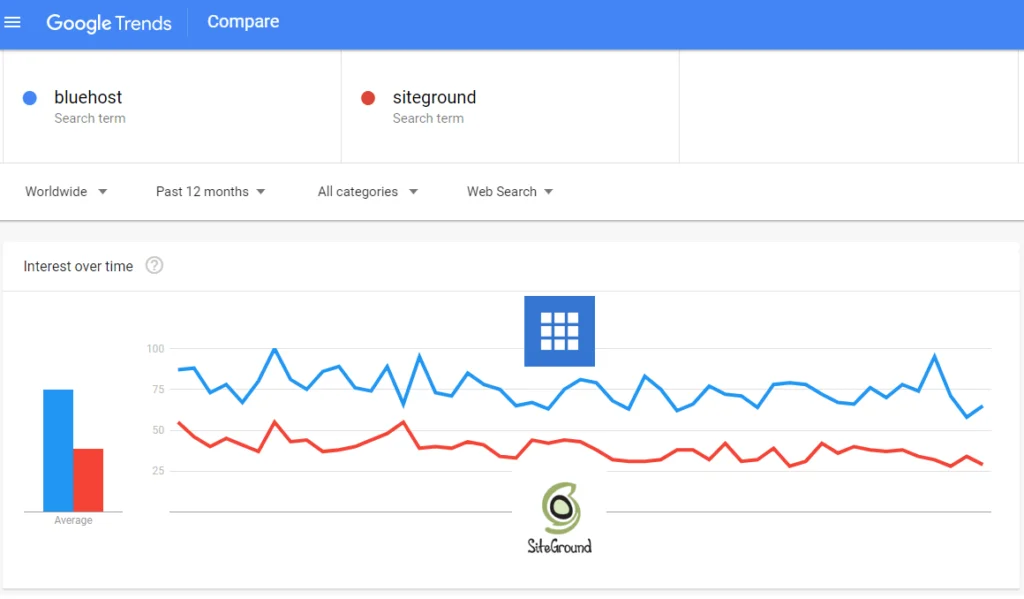Since SiteGround and Bluehost are two of the most popular web hosting companies in the world, chances are they’re at the top of your to-consider list. But which one should you go with? Read my SiteGround vs Bluehost comparison to find out.
🤜 Head-to-head Bluehost vs. SiteGround comparison 🤛. Both are two heavyweights in the web hosting industry and this comparison aims to determine which one is the best of the two.
Key Takeaways:
SiteGround is a better option for small businesses and offers better performance, while Bluehost is more suitable for larger websites and has more hosting options.
Both SiteGround and Bluehost offer 24/7 support through live chat, but SiteGround’s support is more expert, efficient and helpful according to customer reviews.
SiteGround’s pricing is higher than Bluehost’s, but they offer more performance and security features and better uptime. Bluehost offers cheaper prices and more budget-friendly hosting plans.
The main difference between SiteGround and Bluehost is that SiteGround performs better, but Bluehost is cheaper. Here’s the bottom line:
- Overall, SiteGround is better than Bluehost, but choosing between SiteGround and Bluehost is going to come down to two things.
- SiteGround is the best option when it comes to performance and speed.
- Because SiteGround delivers industry-leading performance and speed (Google Cloud Platform servers, SSD, NGINX, built-in caching, CDN, HTTP/2, PHP7) and with plans starting from $2.99/month.
- Bluehost is the best option when it comes to price and website building
- Because Bluehost is cheaper plans start from $2.95/month and include a free-of-charge domain name, and come with a beginner-friendly website builder.
If you don’t have time to read this SiteGround vs. Bluehost 2024 comparison review, just watch this short video I put together for you:
Although both web hosts provide excellent server uptime and solid website security, SiteGround beats Bluehost with its above-average site speed, top-rated customer support team, and advanced features like the SuperCacher technology and the Git integration option.
However…
If this was a (Google) popularity contest, then this Bluehost vs. SiteGround comparison would be over very quickly; because Bluehost is way more searched for on Google than SiteGround.
Also, keyword research tools, such as KWFinder, reveal that Bluehost has over 300k monthly searches on Google, almost double compared to SiteGround.
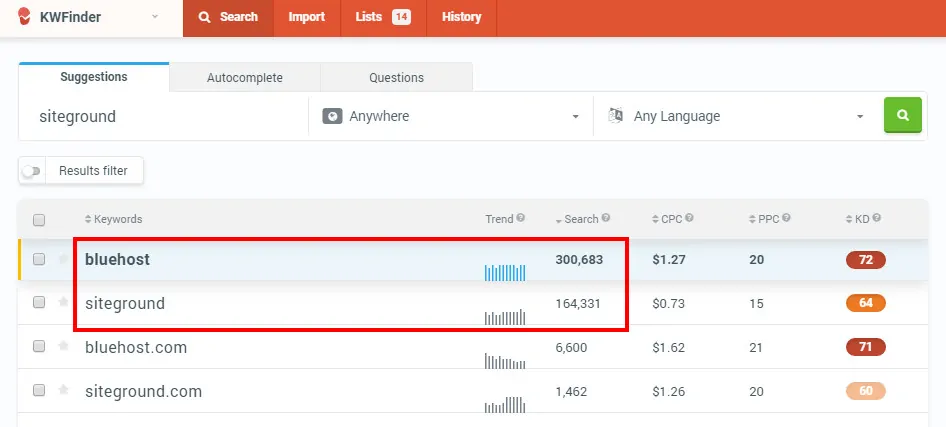
But search demand is, of course, far from everything when it comes to finding the best web host.
Reddit is a great place to learn more about SiteGround and Bluehost. Here are a few Reddit posts that I think you’ll find interesting. Check them out and join the discussion!
In this article, I will test and compare the below:
- Key features
- Speed & uptime
- Security & privacy
- Customer support
and of course:
- Pricing plans
and for each section, a “winner” will be declared.
Key Features
| Hosting Feature | SiteGround | Bluehost |
| Types of hosting services | Shared website hosting, WordPress hosting, WooCommerce hosting, cloud, and reseller hosting | Shared website hosting, WordPress hosting, WooCommerce hosting, VPS hosting, and dedicated web hosting |
| Free custom domain name | No | Yes (for the first year only) |
| Sub and parked domains | Yes (unlimited in all shared hosting plans) | Yes (unlimited in all shared hosting plans except the entry-level bundle) |
| Free domain-associated email | Yes (unlimited email accounts in all hosting plans) | Yes (free business email addresses at your own domain in all hosting plans) |
| Free CDN (content delivery network) | Yes | Yes |
| Webspace limit | Yes | No (except in the entry-level bundle) |
| Bandwidth/data transfer limit | No | No |
| Free WordPress installation | Yes | Yes |
| Free website builder | Yes (Weebly website builder) | Yes (Bluehost website builder) |
| Option to add multiple users | Yes | Yes (for WordPress sites only) |
| Website | www.siteground.com | www.bluehost.com |
SiteGround Features
SiteGround includes many useful features in its hosting bundles, but the most significant ones are the following six:
- Powered by Google Cloud infrastructure
- SiteGround’s SuperCacher technology;
- Free CDN service;
- SiteGround’s WordPress Migrator plugin;
- SiteGround’s WordPress site optimization plugin (SiteGround Optimizer);
- WordPress staging tool; and
- Free Weebly website builder.
Let’s see what each of these features brings to the table.
SiteGround SuperCacher Services
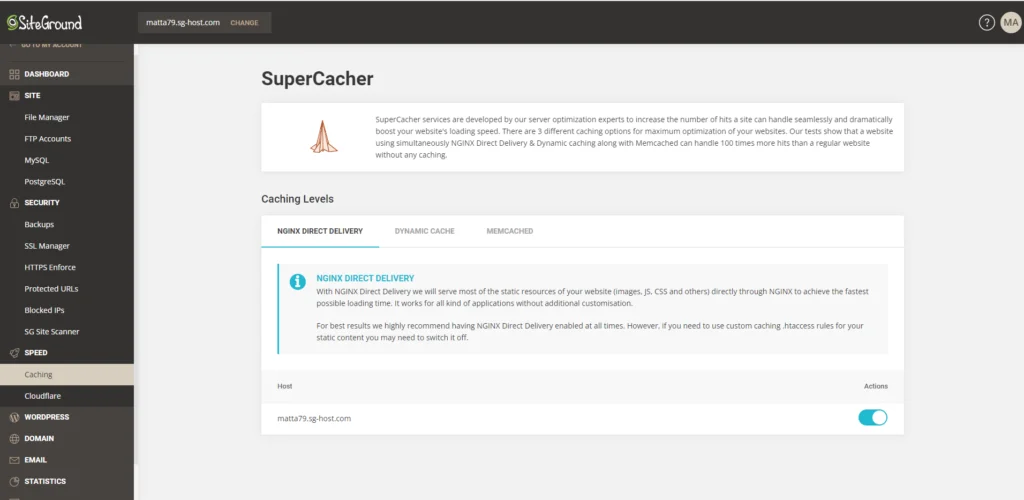
SiteGround’s SuperCacher technology is an extremely valuable hosting feature. Its main purpose is to increase your site speed by caching results from database queries and dynamic pages.
The SuperCacher services have 3 caching levels: NGINX Direct Delivery, Dynamic Cache, and Memcached. The NGINX Direct Delivery solution improves your website’s loading time by caching most of your static web content (images, JavaScript files, CSS files, and other resources) and storing it in the server’s RAM memory. This means SiteGround will serve these static website resources to your visitors directly through your server’s RAM, thus achieving faster load times.
The Dynamic Cache layer is a full-page caching mechanism for non-static website resources. It boosts both your webpages’ TTFB (time to first byte) and your site’s loading speed. If you run a WordPress-powered website, this caching level is a must.
Finally, the Memcached system is designed to improve the connection between your application and its database. It accelerates the loading of dynamic content such as dashboards, backends, and checkout pages. These types of dynamic website resources cannot be served by the Dynamic Cache mechanism.
Free CDN
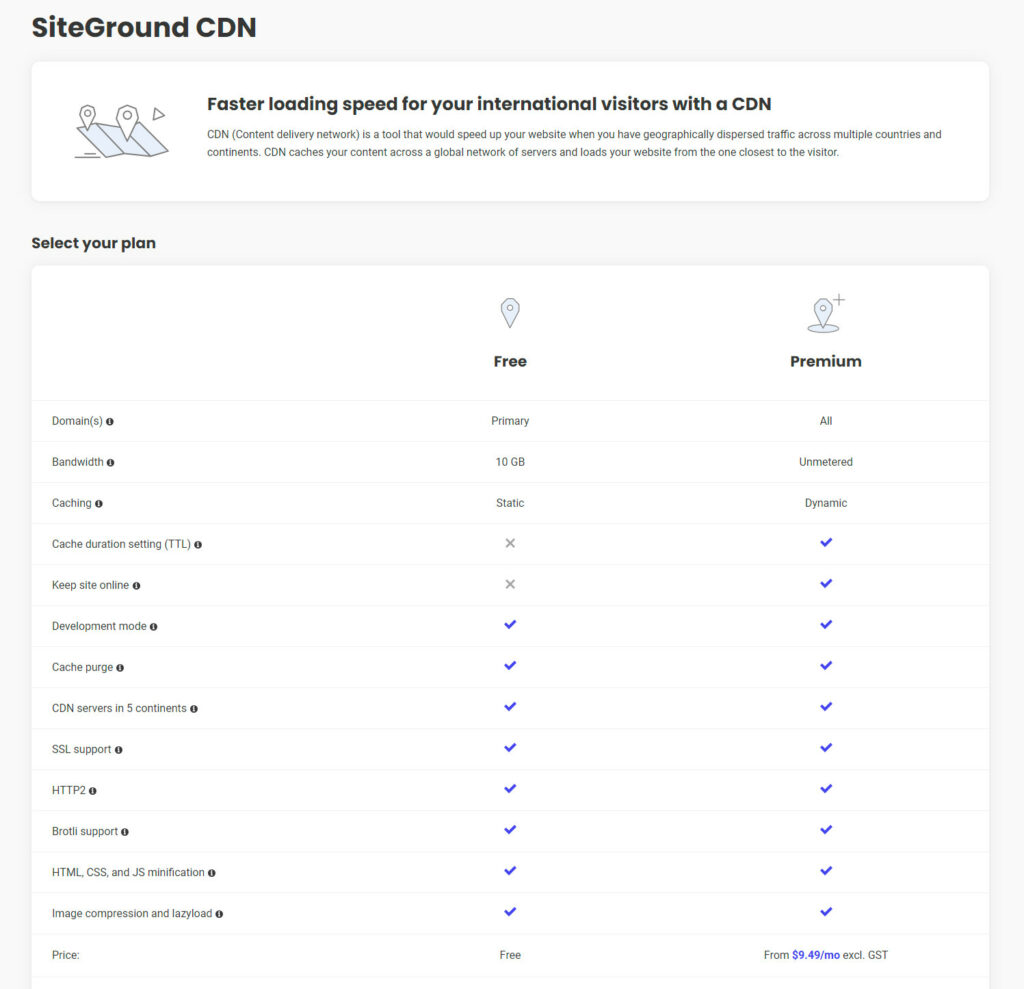
All SiteGround plans come with a free CDN service. CDN (content delivery network) saves the day when your website traffic is made up of geographically dispersed visitors. This tool boosts your site speed by caching your web content and distributing it to multiple data centers across the globe so each of your visitors receives your content from the server closest to them.
SiteGround’s CDN 2.0 is guaranteed to increase your website’s speed. On average, you can expect a 20% uptick in loading speed, and for some specific global regions, that number could even double! This is made possible by harnessing the capabilities of Anycast routing and Google network edge locations. Enjoy this seamless, speedy experience!
WordPress Migrator Plugin

If you want to transfer your WordPress-powered website to SiteGround, you can take advantage of SiteGround’s free-of-charge WordPress migrator plugin. The process is relatively simple: you need to generate a migration token from your SiteGround account, install the SiteGround Migrator plugin to your WordPress site, paste the token into the plugin, and follow the instructions.
Bluehost, on the other hand, doesn’t provide a free site migration solution. It can transfer up to 5 sites and 20 email accounts for $149.99, which some users might find quite expensive.
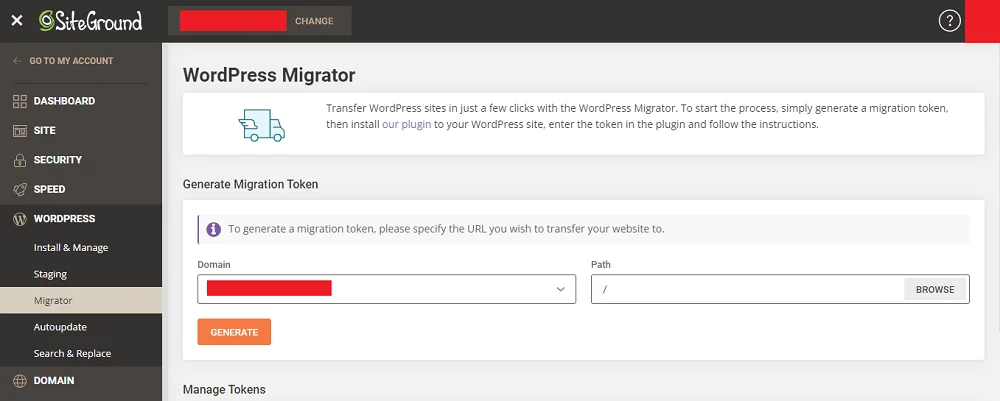
SiteGround Optimizer Plugin

As a WordPress host, SiteGround has plenty to offer. The SiteGround Optimizer plugin is without a doubt one of the web host’s most powerful tools for WordPress users. This plugin was developed and is regularly improved to help you improve your site’s speed and performance. It uses multiple optimization techniques, but two of the most important ones are scheduled database maintenance and image compression.
The scheduled database maintenance feature optimizes MyISAM tables, deletes all automatically created posts and page drafts, deletes all comments marked as spam, etc.
The image compression feature resizes your images to decrease the disk space they occupy and thus speed up their loading time. This technique uses a resizing algorithm that doesn’t change your image dimensions or drastically decrease the quality of your media. I love that there’s a preview option that lets you choose a compression level and see the effect on the image.
WordPress Staging Tool
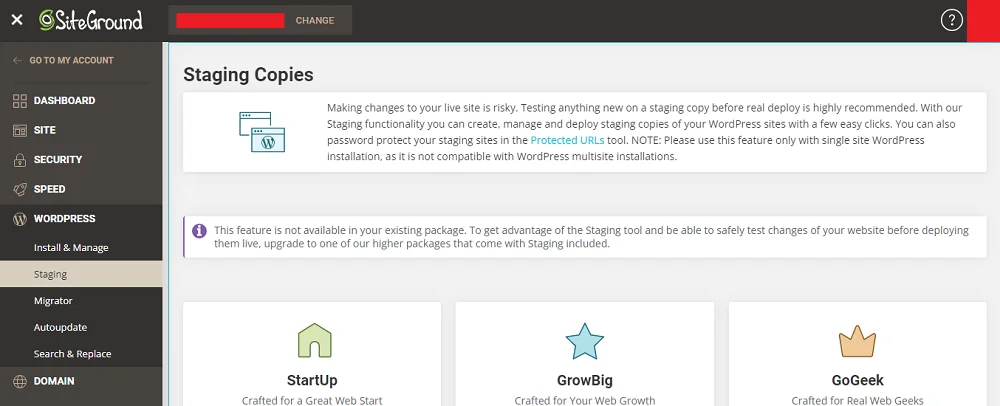
If you want to implement big changes and updates in your WordPress site, the WordPress staging tool will let you do it risk-free. You won’t have to be a ‘cowboy coder’ (make changes in the live environment) as you’ll be able to create an exact working copy of your website. Then, you’ll be able to test new plugins and/or introduce changes to your web design before deploying them live in one click. This is how you’ll avoid making costly mistakes.
The WordPress staging functionality allows you to manage your staging copies in several different ways, including performing a full or custom deployment, destroying them, and replicating them. What’s more, this tool comes with the option to protect your development website copies with a password.
Free Weebly Site Builder
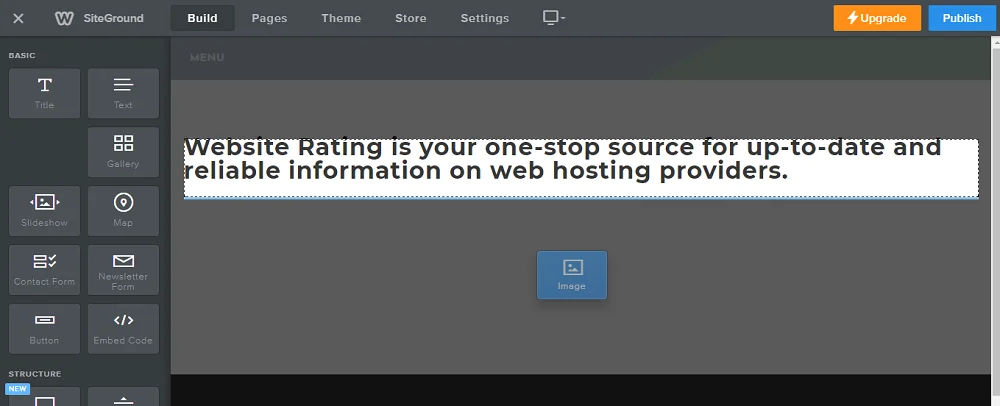
Every account owner can install the free version of the SiteGround website builder, Weebly. This drag-and-drop website-building tool is simple and easy to use. It allows you to bring your professional website concept to life by adding a variety of content and design elements to your site, including titles, text sections, images, galleries, slideshows, contact and newsletter forms, social icons, and buttons. You can also improve the structure of your web pages with the help of dividers and spacers.
If you want to save yourself some time, you can select one of Weebly’s mobile-responsive themes and use it as a starting point. There are plenty of website designs to choose from, meaning it shouldn’t be hard to find one that suits your style.
The Weebly website builder has premium features as well. Some of the most popular ones are the app center, the advanced site statistics feature, the site search functionality, and, of course, the online shop. To access these and so many more, you’ll need to upgrade your Weebly plan via your SiteGround dashboard.
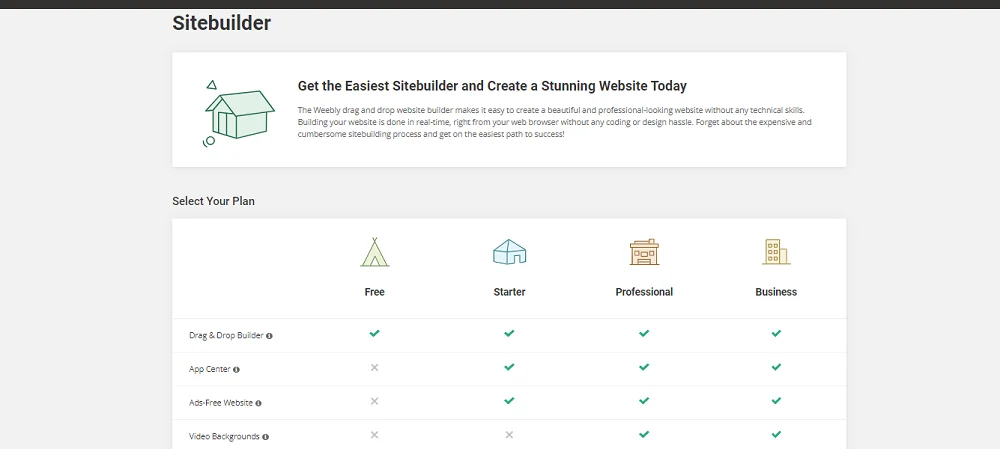
You can activate the free Weebly package while you’re building your website or at a later stage.
Bluehost Features
Bluehost powers more than 2 million websites worldwide at the moment. The widely used hosting platform attracts its customers with multiple great features, including:
- Excellent WordPress integration;
- Beginner-friendly drag-and-drop WordPress site builder;
- 1-year free domain registration;
- Free Cloudflare CDN integration;
- Automated marketing tools; and
- VPS and dedicated web hosting services.
Let’s see how you can benefit from each of these features.
Excellent WordPress Integration

Bluehost is recommended by WordPress itself. This comes as no surprise as the American hosting provider allows you to install the popular CMS (content management system) on your account with a single click.
Aside from this, Bluehost’s managed WordPress hosting includes multi-layered caching for improved site speed, auto-scalability to handle traffic surges, advanced website analytics, and centralized social media control. With its managed WordPress plans, Bluehost has made the WordPress platform fully redundant. Plus, these packages come with a staging environment and daily scheduled backups.
WordPress Site Builder

Bluehost’s WordPress website builder allows you to choose from 300+ design templates and build a professional-looking site fast and easily. There’s also an image library with hundreds of preloaded images you can use. If you can’t find what you’re looking for, the site builder lets you upload your own images, videos, and music with no storage limitations.
Additionally, the WordPress website-building tool gives you the chance to upload fonts in case Bluehost’s suite doesn’t include your favorites. The builder also lets you manage your CSS rules directly via its dashboard.
1-Year Free Domain Registration
Unlike SiteGround, Bluehost includes a free new domain registration or domain transfer for a year. This is an amazing bonus as your domain name is your online address and therefore extremely important. There’s one condition, though: the price of the domain shouldn’t exceed $17.99.
I really like the fact that Bluehost won’t take away your domain name if you realize the service provider isn’t right for you down the road. Once 60 days pass after the registration period, you’ll be able to transfer your domain to another registrar.
Free Cloudflare CDN Integration
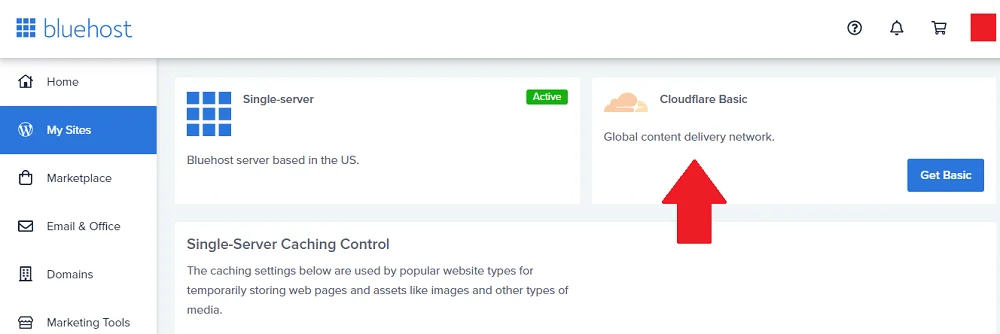
Just like its competitor, Bluehost includes a free Cloudflare CDN service in all its hosting plans. With the basic Cloudflare CDN package in place, your website content will be stored at more than 200 data centers globally, so when someone visits your site they receive your content from a server that’s physically closest to them. This, of course, will boost your site speed as the data will reach its destination much more quickly.
If you want to make the most of Cloudflare’s CDN service, you can buy the premium plan. It comes with rate-limiting (a feature that allows you to shape and block your website traffic based on the number of requests per second), WAF (web application firewall), and Argo smart routing (algorithms that select the fastest available route to transfer your website’s data to the required destination).
Regardless of which Cloudflare CDN package you choose, you’ll get round-the-clock customer care, global HD content streaming, and on-demand edge purge.
Automated Marketing Tools
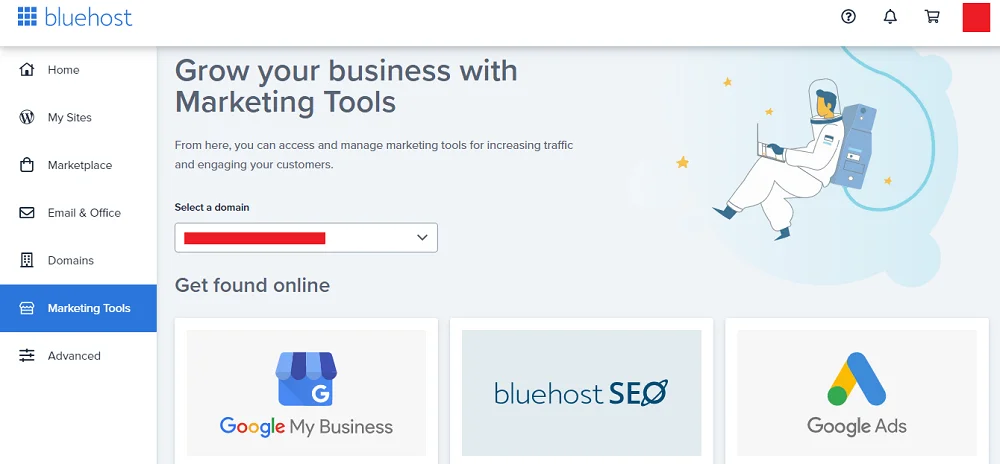
Bluehost has developed an SEO toolset that simplifies the whole search engine optimization process and helps you improve your search engine rankings. With Bluehost’s SEO tools, you’ll be able to see an overview of your SEO performance and detect the issues that hinder your SEO success. You’ll also get a list of suggested keywords to strategically target and optimize your web content with.
The Bluehost SEO toolset also includes step-by-step guidance and competitive intelligence (the latter shows you how your rivals compare to you when it comes to search engine ranking, link popularity, and social media).
Unfortunately, Bluehost doesn’t offer these tools for free. There are two plans you can choose from Start and Grow. The Start plan is created with new websites and businesses in mind and includes 10 keywords, weekly ranking scanning, 2 competitor reports, a step-by-step SEO plan, and monthly progress reports.
The Grow bundle, on the other hand, is ideal for site owners who want to start ranking for more keywords. It comes with 20 keywords, daily ranking scanning, 4 competitor reports, proactive alerts, a step-by-step SEO plan, and a prioritized improvement list.
Another great part of Bluehost’s suite of marketing tools is the free Google My Business integration. With a carefully-built GMB profile, your current and potential customers will be able to get in touch with you across Google Search and Google Maps by calling, messaging, or leaving reviews.
Last but not least, Bluehost includes a special Google Ads offer in all its shared hosting packages. If you reside in the US and are a new advertiser, you’ll be able to start advertising on the popular search engine with a $150 promotional credit.
VPS and Dedicated Hosting Services

Bluehost’s VPS (virtual private server) hosting plans are created to equip you with the necessary resources and tools to build high-performance websites. They come with fully dedicated server resources (your Bluehost account will always have the set amount of storage space, RAM, and CPU you’ve paid for), impressive raw compute power, and full root access to implement configuration changes in your hosting environment.
Bluehost’s VPS hosting features a simple and intuitive dashboard that lets you manage your sites and analyze your performance in one place. Additionally, Bluehost doesn’t limit the amount of traffic your VPS-powered sites get as long as you comply with its Acceptable Use Policy.

Bluehost’s dedicated web hosting provides the ultimate web hosting environment as you don’t share your dedicated server with anyone. This means your resources are guaranteed and your site’s performance is stable and predictable. If your website is receiving huge amounts of traffic, chances are a completely isolated and dedicated server is exactly what you need.
To learn more about Bluehost’s dedicated hosting plans and prices, please read the Bluehost Pricing Plans section below.
🏆 And the Winner Is…
SiteGround! Unlike Bluehost, the Bulgarian hosting platform doesn’t offer VPS and dedicated web hosting services, but its smooth, safe, and free-of-charge WordPress site transfer plugin, expert-developed, in-house caching system, and advanced functionalities like the WordPress staging tool and the Git integration feature make it the superior choice here.
Uptime & Speed
| Uptime & Speed | SiteGround | Bluehost |
|---|---|---|
| Server uptime guarantee | Yes (99.99%) | Yes (99.98%) |
| Average site speed | 1.3s | 2.3s |
| Google PageSpeed Insights | 97/100 | 92/100 |
SiteGround Uptime & Speed
SiteGround is one of the most reliable website hosting platforms right now thanks to its high server uptime and above-average site speed. SiteGround provides its customers with a 99.99% uptime guarantee, which is practically the case with Bluehost as well (it has a 99.98% uptime guarantee).
This means your SiteGround-powered website will be up and running practically 24/7, which is hugely important, especially for online shops (no missed orders).
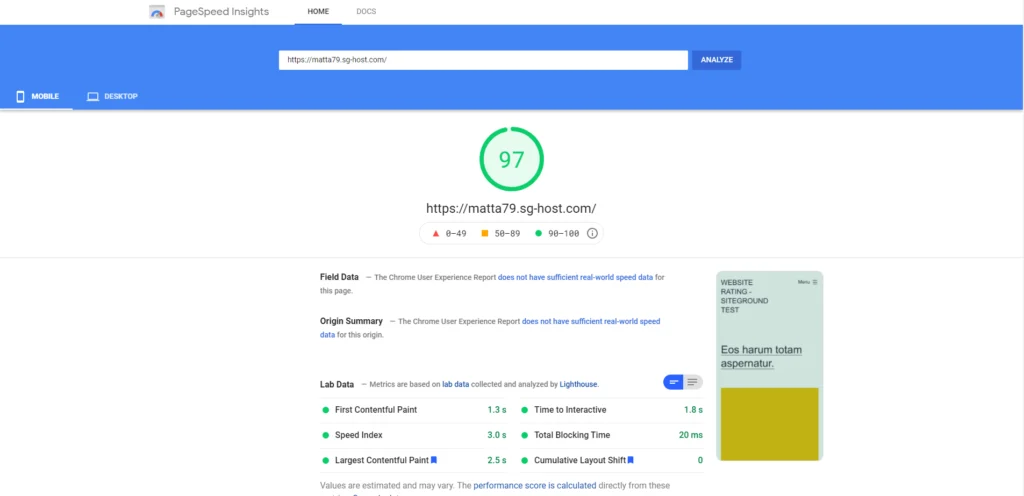
SiteGround doesn’t disappoint when it comes to site speed either. I’ve been testing SiteGround’s speed my test site is hosted with them and its average load time is 1.3 seconds.
Bluehost Uptime & Speed
As I mentioned above, Bluehost’s average server uptime is slightly worse than SiteGround’s — 99.98%. However, that’s still an outstanding result as it means that your Bluehost-powered website will be down for only about 1:45 minutes during the entire year.
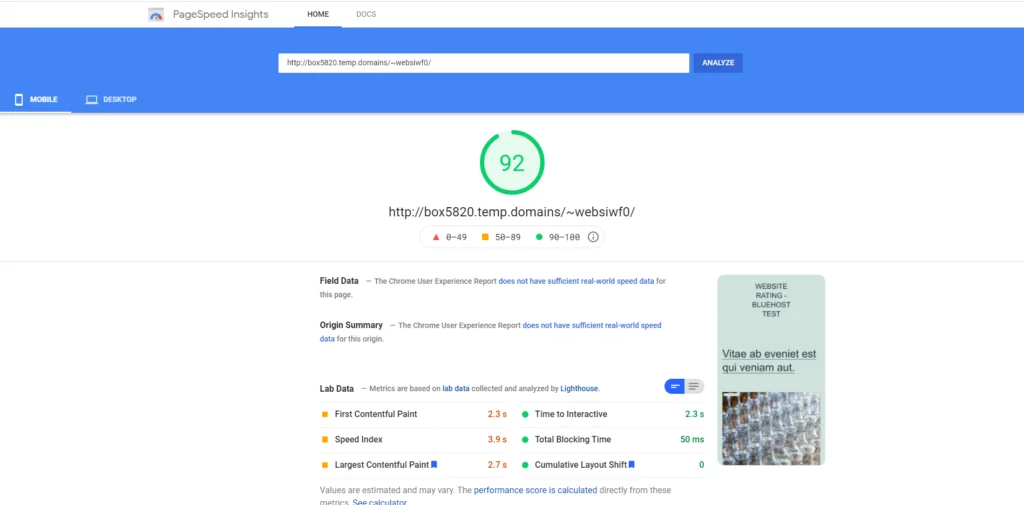
Unfortunately, Bluehost (when compared to SiteGround) disappoints on the site speed front. For my test site hosted on Bluehost, the speed testing yielded an average loading time of 2.3s.
🏆 And the Winner Is…
SiteGround! The numbers don’t lie — SiteGround’s shared web hosting is both more reliable and faster than Bluehost’s. Bluehost needs to significantly up its game to stand a chance in this arena.
Security & Privacy
| Security Feature | SiteGround | Bluehost |
|---|---|---|
| Free SSL security | Yes (included in all hosting plans) | Yes (included in all hosting plans) |
| Automatic PHP updates | Yes | No |
| Automatic WordPress updates | Yes | Yes |
| In-house website backup solution | Yes (provided by SiteGround itself) | Yes (website backup service provided by CodeGuard) |
| Other security measures and tools | Unique account isolation, in-house server monitoring system, spam protection, proactive updates and patches, and SiteGround Security plugin for WordPress websites | IP address blacklists, password-protected directories, SiteLock for protection against cyber attacks, and SpamExperts for a spam-free inbox |
SiteGround Security & Privacy
SiteGround makes sure your website is safe from cyber-attacks and malicious code with the help of a custom web application firewall, a unique AI-driven anti-bot system, and free SSL security regardless of your hosting package. Apart from this, SiteGround automatically updates your PHP version, the WordPress core software, and your WordPress plugins.

Their impressively fast server monitoring system checks the SiteGround server status every 0.5 seconds to prevent potential problems, detect ongoing issues, and fix some of them automatically. What’s more, SiteGround has a team of security experts that monitor the servers 24/7.
Another powerful layer of security SiteGround provides is unique account isolation. This means that all the accounts on SiteGround’s shared servers are isolated from each other, which keeps vulnerable hosting accounts from affecting the rest of the accounts hosted on the same machine. This makes SiteGround’s shared web hosting as secure as dedicated web hosting.
Finally, SiteGround has an in-house website backup service. The hosting provider automatically creates daily backups of your website and stores up to 30 copies. If you make a mistake or change your mind about a recent website update you implemented, you can restore all files and databases from a given day with just a few clicks at no additional cost.
There’s also an on-demand backup option included in the GrowBig and GoGeek bundles.

Bluehost Security & Privacy
When it comes to security and privacy, Bluehost has plenty to offer. Aside from free SSL certificates, Bluehost provides IP address blacklists, filters for email and user accounts, password-protected directories, and SSH (Secure Shell) access which allows for secure file transfer and safe remote logins via the internet.
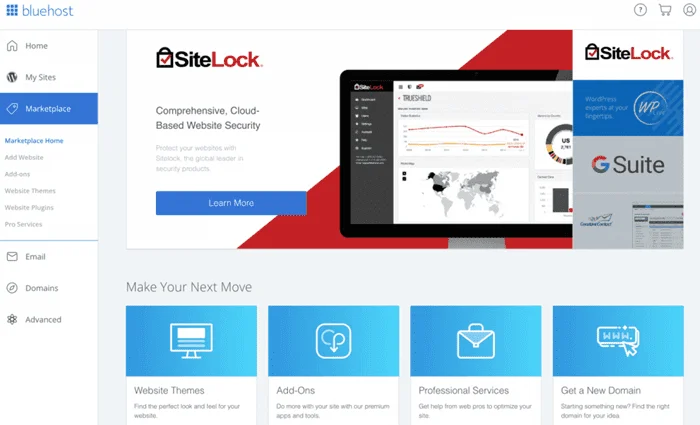
Bluehost also gives you the chance to enhance your site’s security with a variety of add-ons such as SiteLock and SpamExperts. SiteLock will protect your website against cyber attacks with the help of automated malware detection and removal. This app performs daily malware scans (continuous if you buy the most expensive package) and Google blacklist monitoring. Aside from the limited free plan, there are also 3 paid SiteLock packages: Essential, Prevent, and Prevent Plus.
SpamExperts is a sophisticated email filter that scans your incoming email to detect spam, viruses, and other email-related attacks so you can focus on important tasks without having to sift through your inbox for the relevant emails. It does this with 99.98% accuracy and is built to avoid false positives. This add-on gets ahead of attacks by continuously improving data collection and analyses. Bluehost includes the SpamExperts tool in all of its shared web hosting plans except the entry-level one.
When it comes to website backups, Bluehost falls short. Unlike its competitor, Bluehost doesn’t include automated backups in all its shared hosting bundles. Only the Choice Plus and Pro plans come with the CodeGuard-powered automated website backup service, but if you buy the Choice Plus package, you’ll only be able to use the tool during the first year of the contract. Yes, you can purchase a Jetpack or CodeGuard backup plan, but it will increase your total hosting expenses.
🏆 And the Winner Is…
SiteGround! Although Bluehost includes multiple effective security measures in its hosting plans, SiteGround offers the whole package. Bluehost needs to provide all its shared web hosting users with a free backup solution to be able to really compete with SiteGround on this front.
Plans & Pricing
| Plans | SiteGround | Bluehost |
|---|---|---|
| Free trial | No (but you can take advantage of SiteGround’s 30-day money-back guarantee for all shared web hosting plans) | No (but you can take advantage of Bluehost’s 30-day money-back guarantee for all hosting plans) |
| Free plan | No (but you can get free hosting if you send someone your unique referral link and they sign up for a SiteGround account using it) | No |
| Shared web hosting plans | 3 (StartUp, GrowBig, and GoGeek) | 4 (Basic, Plus, Choice Plus, and Pro) |
| WordPress hosting plans | 3 (StartUp, GrowBig, and GoGeek) | 4 (Basic, Plus, Choice Plus, and Pro) + 3 managed WordPress hosting packages (Build, Grow, and Scale) |
| WooCommerce hosting plans | 3 (StartUp, GrowBig, and GoGeek) | 2 (Standard and Premium) |
| Cloud hosting plans | 4 (Jump Start, Business, Business Plus, and Super Power) | None |
| VPS hosting plans | None | 4 (Standard, Enhanced, Premium, and Ultimate) |
| Dedicated hosting plans | None | 3 (Standard, Enhanced, and Premium) |
| Reseller hosting plans | 3 (GrowBig, GoGeek, and Cloud) | None (Bluehost recommends ResellerClub) |
| Multiple billing cycles | Yes (1 month, 12 months, 24 months, and 36 months) | Yes (1 month*, 12 months, and 36 months) |
| Lowest monthly subscription cost | $2.99/month** (StartUp hosting plans) | $2.95/month*** (Basic hosting plans) |
| Highest monthly subscription cost | $380 (Super Power cloud plan) | $209.99**** (Premium dedicated plan) |
| Discounts and coupons | None (but there are special shared web hosting plan prices for first orders) | None (but there are special intro offers) |
**This price applies for the first yearly subscription only.
***This price applies for the first yearly subscription only.
****This price applies for the first three-year subscription only.
SiteGround Pricing Plans
Since SiteGround sells many hosting services and plans, I decided to focus only on its cloud and shared hosting bundles here. If you want to familiarize yourself with all of SiteGround’s hosting packages, please check out my SiteGround review.
Shared Hosting Plans

Shared Hosting Features
SiteGround offers 3 shared hosting plans: StartUp, GrowBig, and GoGeek. Each of these bundles comes with a free drag-and-drop website builder (Weebly), a free CMS installation (WordPress, Joomla!, Drupal, etc.), and an unlimited number of free email accounts at your custom domain. What’s more, all of these packages feature SiteGround’s intuitive Site Tools for easy website management.
When it comes to site performance and speed, every SiteGround shared web hosting plan owner can change their data center to improve their page loading times (the closer your data center is to your visitors, the faster your site will load). Additionally, each of these plans uses super-fast SSD storage and includes free CDN.
Unfortunately, none of SiteGround’s shared hosting packages comes with a free custom domain. This is one of the Bulgarian web host’s biggest weaknesses, especially considering that most of its rivals, including Bluehost, include this freebie in their bundles.
StartUp Plan
For $2.99/month during the first year (SiteGround will charge you the regular price for all subsequent renewals), the StartUp plan allows you to host one website and use 10GB of disk space. The data transfer is unmetered.
GrowBig Plan
If you need more web space and/or want to host multiple sites, the GrowBig plan might tick all your boxes. For $7.99/month for the first year, this hosting package provides you with 20GB of storage space, hosting for an unlimited number of websites, and SiteGround’s premium server resources.
GoGeek Plan
Last but not least, the GoGeek plan allows you to host unlimited websites, entitles you to 40GB of web space, and comes with SiteGround’s geeky server resources. Plus, this package includes integration with Git so you can create, access, download, and edit repositories of your site. For $4.99/month during the first year, the GoGeek bundle also gives you the chance to give your clients white-label access to your account and entitles you to priority customer care supplied by SiteGround’s senior support agents.
Cloud Hosting Plans
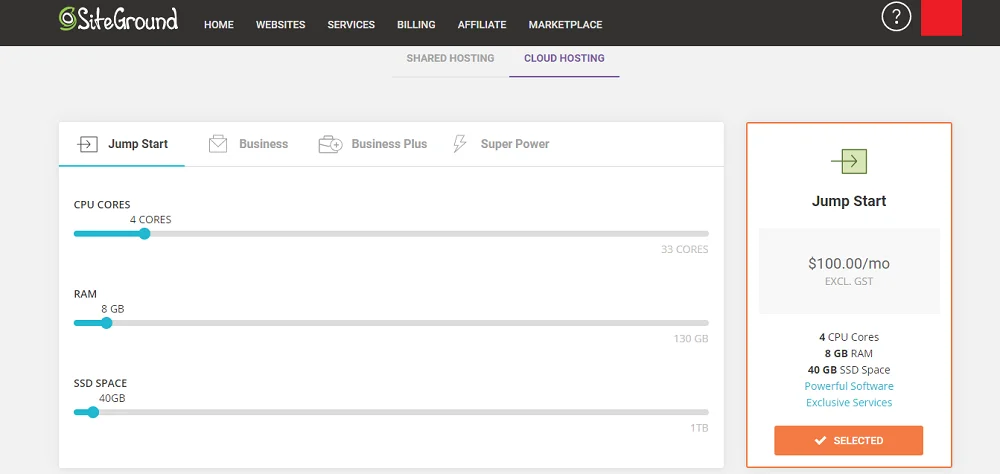
Cloud Hosting Features
If you run a complex website with large amounts of monthly traffic, you’ll be glad to learn that SiteGround has 4 cloud plans: Jump Start, Business, Business Plus, and Super Power. Each of these bundles is created to help you maximize your website speed and performance.
All four of SiteGround’s cloud hosting packages come with a free CDN service to speed up your site loading times when you have visitors from different parts of the world. In addition to this, each SiteGround cloud plan includes a free dedicated IP as a layer of protection from having your site end up on a so-called IP blacklist.
As a SiteGround cloud hosting plan owner, you’re entitled to automate daily website backups for increased security. SiteGround keeps up to 7 copies of your cloud account and offers you the possibility to request 5 additional backups for free. These are kept for a week. In case these actions don’t seem safe enough, you can ask SiteGround to store your backups in a data center located in a different city, state, or even country.
SiteGround’s cloud hosting packages give you direct SSH (Secure Shell or Secure Socket Shell) access to your account and come with SFTP (Secure File Transfer Protocol) so you can access, transfer, and manage your files in a safe manner.
SiteGround’s Collaboration Tools are yet another extremely useful cloud hosting feature. Each of the cloud plans allows you to add collaborators to any of your websites, thus giving them access to the Site Tools of the respective site. The Collaboration Tools feature also enables you to ship finished websites from your cloud account to a different SiteGround customer. Obviously, this option is created with developers and designers in mind.
My personal favorite cloud hosting feature is SiteGround’s autoscale functionality. This option allows you to set your cloud server to scale up automatically when you use 75% of the CPU or RAM included in your plan. You can select the number of CPU cores and amount of GB of RAM SiteGround should add to your account when you reach the defined threshold. To avoid ending up paying an enormous sum of money, SiteGround allows you to set a monthly cap as well.
Jump Start Plan
The Jump Start plan is SiteGround’s entry-level cloud hosting bundle. It costs $100 a month and includes 4 CPU cores, 8GB of RAM, 40GB of SSD storage space, and 5TB of data transfer. This package also features the iptables firewall (a command-line firewall that makes use of policy chains or chains of rules to allow or block traffic) and the Exim mail server.
Business Plan
The Business plan, as SiteGround promotes it, is made to optimize your cloud experience. For $200 per month, you’ll have 8 CPU cores, 12GB of RAM, 80GB of SSD space, and 5TB of data transfer at your disposal. You’ll also be able to choose from a number of PHP versions so you can set up the right one for your site.
Business Plus Plan
The Business Plus bundle costs $300 a month and comes with 16GB of RAM, 120GB of SSD storage, 5TB of data transfer, and 12 CPU cores. The great number of CPU cores this plan includes makes it perfect for websites that use databases or rely on PHP scripts.
Super Power Plan
The Super Power package is the ultimate cloud hosting solution the Bulgarian web hosting company sells. For $400 per month, you’ll receive 16 CPU cores, 20GB of RAM memory, 160GB of SSD storage space, and 5TB of data transfer. Additionally, the Super Power plan entitles you to round-the-clock VIP customer support, 7 website backups from the last 7 days, caching, automated WordPress updates, WordPress staging, Git integration, and email spam filtering.
Bluehost Pricing Plans
Bluehost has a rich offer of website hosting services, as well. That’s why I’ll only introduce you to the hosting provider’s shared and dedicated web hosting plans. If you want to explore the rest of Bluehost’s hosting bundles, please read my Bluehost review.
Shared Hosting Plans

Shared Hosting Features
As you can see from the screenshot above, Bluehost sells 4 shared hosting bundles: Basic, Choice Plus, Online Store, and Pro. Whichever plan you choose, you’ll have access to Bluehost’s beginner-friendly WordPress site builder and domain manager. The former allows you to create beautiful websites without having to know how to code, while the latter lets you purchase, update, transfer, and manage your domains in one place.
As a Bluehost shared hosting user, you’ll also receive free SSL security. What’s more, each of Bluehost’s shared hosting packages includes resource protection to keep your website’s performance intact even if other sites are being hosted on the shared server as well.
Bluehost includes Google Ads and Google My Business integration in all its shared hosting bundles. It gives its US-based shared hosting customers a Google Ads match credit with a value of up to $150. You can use this credit only on your first campaign.
The Google My Business integration comes in handy for those of you who want to boost your local SEO rankings. This feature allows you to list your business online and provide your current and potential clients with important information like your location, working hours, phone number, and, of course, website.
Basic Plan
The Basic plan costs $2.95/month if you purchase a yearly subscription, but this price applies for the first invoice only (Bluehost will charge you the regular rate if you decide to renew the plan). It includes hosting for one website, 10GB of SSD storage space, free CDN, and one free-of-charge domain registration for a year. This is Bluehost’s only shared hosting package that doesn’t come with unlimited storage.
Online Store Plan
If you want to host and run multiple websites from a single Bluehost account, the Plus plan might be a good solution for you. For $9.95/month for the first annual contract, you’ll receive 100 GB SSD storage, customizable WordPress themes, 24/7 customer support, and one free Microsoft 365 Email Essentials license for 30 days.
Choice Plus Plan
The previous two plans come with great features, but they fall short when it comes to privacy and security. That’s why Bluehost recommends the Choice Plus bundle. For $5.45/month, if you buy an annual subscription (keep in mind that this plan will auto-renew at its regular price), you’ll get hosting for unlimited websites, 40 GB SSD storage, a free-of-charge domain for a full year, free CDN, and one free Microsoft 365 Mailbox for 30 days. You’ll also receive free domain privacy to keep your home mailbox free from unwanted contacts and spam. Lastly, you’ll be entitled to a free automated website backup service for the first year of the contract.
Pro Plan
The Pro bundle is Bluehost’s ultimate shared hosting plan because it includes everything in the Choice Plus package and offers optimized CPU resources to provide more processing power and speed. In addition to this, the Pro plan includes CodeGuard’s automated site backup service for the entire term, a free dedicated IP, and a positive SSL certificate. To receive all of these basic and advanced hosting features, you’ll have to pay $13.95/month by purchasing a 12-month subscription. If you decide to renew this plan once the first term ends, Bluehost will charge you the regular yearly price — of $28.99.
Dedicated Hosting Plans

Dedicated Hosting Features
Unfortunately, Bluehost doesn’t offer cloud hosting services. However, its dedicated hosting is a powerful hosting solution for those who want to grow their online presence with more flexibility, speed, and control. Bluehost sells 3 dedicated website hosting plans: Standard, Enhanced, and Premium.
As a Bluehost dedicated website hosting plan owner, you’ll have the freedom to configure your dedicated server however you want without worrying about the actions of other hosting users as you won’t share your server with anyone.
Each of Bluehost’s dedicated website hosting packages features an improved cPanel account control panel that allows you to manage all of your websites, domains, emails, and resources from a single central dashboard. Additionally, these plans include one year of free domain registration, free SSL security, RAID storage for added security, and expedited customer care supplied by Bluehost’s dedicated hosting agents.
One of my favorite Bluehost dedicated website hosting features is the full WHM (web hosting manager) with root access. This means you can:
- Create, delete, and suspend your cPanel accounts;
- Perform password resets;
- Access the DNS zones of all of your domains;
- Configure your own customer support requests;
- Check your server information and status;
- Install SSL certificates;
- Restart services (HTTP, mail, SSH, etc.);
- Assign IP addresses, and perform a number of other actions.
Standard Plan
The Standard plan costs $79.99 per month if you purchase a 3-year contract. It provides you with 4 CPU cores, 4GB of RAM, 2 x 500GB of RAID Level 1 storage, and 5TB of network bandwidth. Plus, the Standard dedicated hosting bundle comes with one free domain for the first year and 3 dedicated IPs.
Enhanced Plan
For $99.99 a month for the first 36-month term, the Enhanced plan will provide you with more storage and processing power. It comes with 2 x 1,000GB of RAID Level 1 storage, 4 CPU cores, 8 CPU threads, 8GB of RAM memory, and 10TB of network bandwidth. The Enhanced bundle also includes one free domain registration for the first year and 4 dedicated IPs.
Premium Plan
Last but not least, the Premium plan is built to support the most complex and high-performance websites. For $119.99 per month if you buy a 3-year subscription, you’ll have 4 CPU cores, 8 CPU threads, 16GB of RAM, 2 x 1,000GB of RAID Level 1 storage, and 15TB of network bandwidth to work with. Plus, you’ll get one free domain for the first 12 months and 5 dedicated IPs.
🏆 And the Winner Is…
Bluehost! The American web host wins this round thanks to the 1-year free custom domain registration included in all its plans, the unmetered bandwidth, the unlimited storage space in most of its packages, and the superior introductory prices. SiteGround will have to throw in a few more freebies to beat Bluehost in this arena.
Customer Support
| Type of Customer Suppor | SiteGround | Bluehost |
|---|---|---|
| Live chat | Yes | Yes |
| Phone support | Yes | Yes |
| Tickets | Yes | Yes |
| Articles and tutorials | Yes | Yes |
SiteGround Customer Support
As a SiteGround account owner, you’re entitled to round-the-clock customer care. You can reach out to SiteGround’s fast and friendly customer support team via phone, email (submit a support ticket), or live chat. In addition to this, SiteGround has more than 4,500 up-to-date articles that can help you get started and make the most of your hosting package. There are also how-to tutorials and free ebooks on SiteGround’s website, which makes it great for beginners.
Bluehost Customer Support
Regardless of your hosting package, you can contact Bluehost’s support team via live chat, phone, or email whenever you need assistance. Plus, Bluehost has a large knowledge base that can help you understand and go through various setup, configuration, and troubleshooting steps. Last but not least, Bluehost has a resource center filled with guides, articles, and videos that can help you take your website and your overall online presence to the next level.
🏆 And the Winner Is…
It’s a tie! Both web hosts provide the same communication channels and have a vast base of knowledge resources that can help you understand and take advantage of all the features included in your plan. However, Bluehost’s support team might annoy some of you as they tend to push for upsells.
Recent Improvements & Updates
Bluehost and SiteGround are constantly updating and improving their hosting services, such as adding more features, adding new data centers and CDN locations, and providing better services.
Considering the recent improvements made by both SiteGround and Bluehost, here’s an updated comparison that factors in these advancements:
SiteGround:
- New Features: Introduction of AI Email Writer, Email Scheduling, and a lead generation plugin for WordPress.
- Security Enhancements: The ‘Under Attack’ mode in SiteGround CDN to block sophisticated HTTP attacks.
- Development Updates: Availability of PHP 8.3 (Beta 3) for testing and implementation of Sender Rewrite Scheme (SRS) for more reliable email forwarding.
- Infrastructure Expansion: Launch of a new Paris (France) data center and custom CDN.
- Marketing Tools: Introduction of SiteGround Email Marketing tool for business growth.
Bluehost:
- Professional Email Service: Launch of Bluehost Professional Email and integration with Google Workspace to enhance business communications.
- Migration and Management Tools: Free WordPress Migration plugin and a new Control Panel for server and hosting management.
- WonderSuite Features: Includes WonderStart, WonderTheme, WonderBlocks, WonderHelp, and WonderCart for an enhanced website creation and e-commerce experience.
- Performance Upgrades: Offering advanced PHP 8.2 and implementing LSPHP handler and OPCache for faster PHP execution and website performance.
Bluehost has focused on enhancing its e-commerce functionality, user experience with WonderSuite, and performance upgrades, SiteGround has emphasized security, email marketing enhancements, and infrastructure growth.
🏆 And the Winner Is…
It’s a tie…. because both have made significant strides, but the choice between them depends on your specific needs and priorities, such as focusing on e-commerce (Bluehost) versus advanced email marketing tools and security (SiteGround).
Questions & Answers
Our Verdict
So, which one is better, SiteGround or Bluehost?
It depends on your needs. Bluehost is better for beginners because it provides better and more user-friendly website building tools, while SiteGround is better for businesses because it provides better performance and security.
Overall, SiteGround is a pretty fantastic web host for people who’re creating their first website. SiteGround’s technical features and focus on speed, uptime, security, and better support make them the #1 hosting choice right now.
In this Site Ground vs Bluehost (2024 update) head-to-head comparison, when deciding what is better Bluehost or SiteGround, SiteGround comes out as the clear winner. I have had a great experience with SiteGround and I recommend you use them if you want a fast reliable web hosting provider.
SiteGround takes the crown thanks to its high reliability and speed, in-house caching system, amazing backup solution, and quick customer support.
However, Bluehost might be more suitable for you if you’re on a budget, need a lot of storage space, and don’t mind working with slower websites.
How We Evaluated Bluehost vs. SiteGround
When we review web hosts, our evaluation is based on these criteria:
- Value for Money: What types of web hosting plans are on offer, and are they good value for money?
- User Friendliness: How user-friendly is the signup process, the onboarding, the dashboard? and so on.
- Customer Support: When we need help, how quickly can we get it, and is the support effective and helpful?
- Hosting Features: What unique features does the web host provide, and how do they stack up against competitors?
- Security: Are essential security measures like SSL certificates, DDoS protection, backup services, and malware/virus scans included?
- Speed and Uptime: Is the hosting service fast and reliable? What types of servers do they use, and how do they perform in tests?
For more details on our review process, click here.



